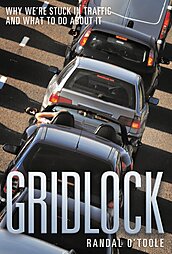America is the most mobile society in history, but our transportation system is on the verge of collapse. Traffic congestion is today five times greater than it was 25 years ago, yet many transportation plans and projects are making it worse. As Randal O’Toole reveals in Gridlock, the prime causes of our ailing system are a government transportation planning philosophy whose primary goal is to diminish auto use—hence, personal mobility—in combination with federal budget incentives that perversely encourage transportation planners to increase congestion. As a result, the automobile which is accessible to almost every family in the nation and provides unparalleled access to better housing, low-cost consumer goods, a choice-driven affordable life, and freedom—is being deliberately forced off the transportation grid by the expensive “solution” of little-used high-speed trains and urban transit lines.
Not only is this costly, illustrates Gridlock, it won’t even accomplish the goals of saving energy and protecting the environment. “We can spend tens or hundreds of billions of taxpayer dollars on transportation projects that sound good but really only serve a small elite,” writes O’Toole, “or we can restore a user-fee-driven system that will continue to improve personal mobility and reduce transportation costs for generations to come.”
Gridlock presents a wide range of innovative ideas and policy recommendations for creating an effective transportation system—improvements that will increase our mobility and pay for themselves, whether it’s cars, buses, planes, or trains. At the center of O’Toole’s solutions are three core principles: those who use transportation facilities should pay for them; negative effects should be dealt with in a cost-efficient manner; and new technologies that will increase mobility at a low cost must be embraced. In Gridlock, Randal O’Toole brings energetic and unconventional thinking to transportation strategies that have, until now, only driven us into the breakdown lane.
